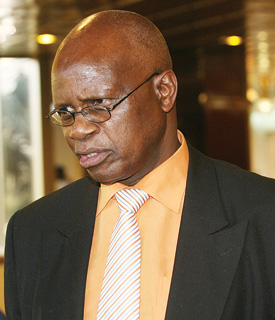
CHEROKEE-AMERICAN cowboy, comedian, social commentator, vaudeville performer and actor Will Rogers once said: “The minute you read something that you can’t understand, you can almost be sure that it was drawn up by a lawyer.”
Bernard Mpofu Acting Business Editor
Closer to home, lawyers have not only managed to master the art of arguing, bellowing Latin words in courtrooms as well as managing corporate politics in boardrooms, they have also become influential figures in the government.
President Robert Mugabe on Tuesday appointed former Justice minister Patrick Chinamasa the new Finance minister.
A lawyer by training, Chinamasa succeeds another lawyer, Tendai Biti, from the opposition MDC led by Morgan Tsvangirai.
Emmerson Mnangagwa, another lawyer, has in the past taken up the Finance portfolio, albeit in an acting capacity. What does this say about Mugabe? After criticising past ministers of practicing bookish economics, the veteran leader who won the July 31 elections, now believes that lawyers may have the oomph to drive the economy.
Forget the legalese associated with the profession, lawyers will control Zimbabwe’s Treasury for a cumulative nine years, should Mugabe maintain the same Cabinet.
While Chinamasa is credited by his party Zanu PF for introducing the multiple-currency regime when he was stand-in Finance minister in 2009, his new assignment will certainly not be a stroll in the park.
- Chamisa under fire over US$120K donation
- Mavhunga puts DeMbare into Chibuku quarterfinals
- Pension funds bet on Cabora Bassa oilfields
- Councils defy govt fire tender directive
Keep Reading
This is certainly the Cabinet’s hottest seat at the moment, given expectations from several quarters and the pressure Biti endured.
The Zimbabwe dollar became worthless due to a decade-long economic meltdown which ended after dollarisation.
The stakes are high and a host of problems continue to confront the economy. Chinamasa, considered a hardliner in the Zanu PF political matrix and chief negotiator during the inter-party talks, faces a daunting task of approaching organisations he has been fighting.
Whether Chinamasa will attract funders, especially after clashing with the United Nations Development Programme on several occasions, and whether he will eat the humble pie and seek technical support from them, only time will tell. While inflation has slowed down on the back of a weakening rand, the Zimbabwe Stock Exchange seems to have taken a cough after the polls.
Year-end economic growth rates have been revised as mining, manufacturing and agriculture continue to under-perform.
It would be interesting to see whether hawkish Zanu PF politicians will blame Chinamasa for underfunding of agriculture, or they will just blame it on the sanctions.
As former Justice minister, Mugabe could have considered Chinamasa’s political clout in stamping his authority when vultures knock on the door.
Facing pressure from a relentless civil service, Mugabe has already promised uniformed forces a pay rise despite stagnating revenue.
Analysts said if the government suddenly secures more revenue to fund the huge public sector wage bill as promised by Mugabe, then earlier claims by the outgoing Biti of an existing parallel government during the tenure of the just-ended coalition government could be true.
Operating with limited fiscus, the new Finance minister will have to strike that balancing act between populist measures and austerity, given the trickling capital inflows. Official figures show that government revenues have stagnated with recurrent expenditure accounting for 70% due to low business activity.
Revenue collection during the period between January and June amounted to $1,807 billion against a target of $1,7 billion resulting in a positive variance of 0,8%.
Tax revenue accounted for 91% of the total revenue while non-tax revenue accounted for the remaining 9%. Revenue from diamonds, according to Biti, continued to be lower than expected. A salary hike for the civil service will reduce fiscal space. A ballooning import bill currently trebling exports has further worsened the country’s balance of payment position.
Zimbabwe is also saddled with a $10,7 billion debt, which represents 103% of the gross domestic product. Government figures show that over 70% of this debt is accumulated arrears. Zimbabwe has been defaulting on its international debt obligations since 1999.
As Chinamasa strolls to his New Government Complex offices, there is no price for guessing what will be going through his mind. He has less than two months to craft the 2014 national budget, which would be a compass on Zimbabwe’s economic policy.
It remains to be seen whether he will be equal to the task, whether he will be popular with civil servants and whether war veterans, who had developed a habit of demonstrating and knocking at Biti’s doors, will do the same. Let’s wait and find out.










